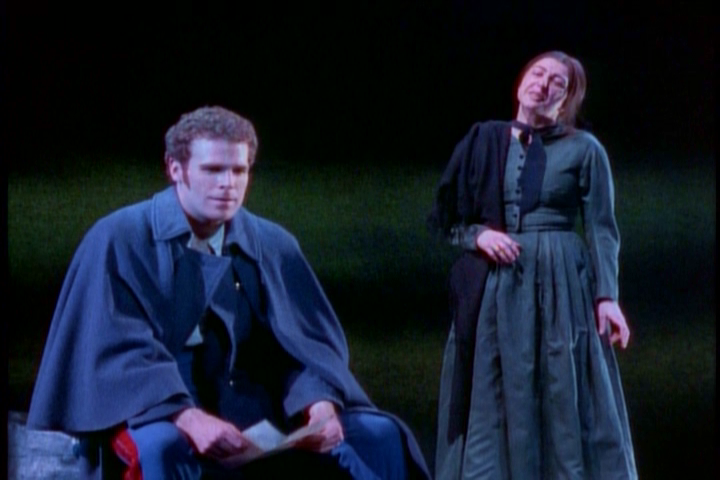
Yesterday, in my review of inSignificant, I started teasing the next thread of the Sondheim Symposium.
For Bobby to progress, he needs to make himself vulnerable and unsafe. We think of him transitioning into the role of servant, as Christ does. A future Bobby, we hope, won’t still be able to be described as “Exclusive you! Elusive you! Will any person ever get the juice of you?” as he is in “You Could Drive a Person Crazy.”
If Company ends with a choice to give oneself (albeit it to an as of yet unspecified beloved), Passion’s plot is driven by the difficulty of knowing of what to do when someone offers themself as a gift to you, unsolicited and possibly unwanted.
Pop over to Wikipedia, if you don’t mind, and check out the synopsis of Passion (it almost certainly won’t be staged near you any time soon, and, though you can and should order the DVD, I don’t think your experience will be spoiled by knowing the plot. Passion derives a lot of it’s tension from the how more than the what). I do really encourage you to click the video links in this post.
Unlike Bobby, Giorgio, the protagonist of Passion is already giving of himself. He’s quick to assume the best of others, and lights up at the possibility to be of use or of comfort to anyone he encounters. Unlike the other officers he serves with, he makes a personal connection with his men. Giorgio is more open than Bobby, but it’s not obvious whether he’s more vulnerable. At the beginning of the show, Giorgio has an easy grace; he shows none of the discomfort that Bobby calls down upon himself in “Being Alive” – the closing number of Company.
Giorgio’s suffering begins when he becomes the focus of Fosca’s love. Fosca is ill and not beautiful, but she is most off-putting because of her relentlessness. She pursues Giorgio without care for her own safety or his reputation. To get a sense of her unmerciful-feeling love, watch “Loving You” below.
Fosca’s love isn’t a gift, it’s a force of nature, and Giorgio only gets to choose how to respond to it. Over the course of the play, Giorgio will turn from his former love, the beautiful Clara, and cleave to the intense, upsetting Fosca. The two women’s loves stand in counterpoint to one another. Giorgio’s first song with Clara is titled simple “Happiness” and, in their letters to each other, they talk about:
Love that fills every waking moment,
Love that grows every single day,
Love that thinks everything is pure,
Everything is beautiful
Everything is possible
Love that fuses two into one,
Where we think the same thoughts,
Love the same things
Live as one.
Feel as one.
Breathe as one
Love that shuts away the world
That envelops my soul,
That ennobles my life
But while Giorgio and Clara feel completed by each other, Fosca approaches Giorgio with a brokenness that cannot be healed. Instead of offering gifts that make the beloved more self-sufficient and stable, Fosca offers up weakness, and challenges her beloved to choose to discomfort himself in order to respond to and care for that weakness. Regardless of what he chooses, Fosca will continue to humble herself grotesquely in pursuit of him.
Bobby casts himself open, choosing to be vulnerable to the next woman to come his way. Giorgio has received what Bobby sought. And tomorrow, I’ll discuss why I found it terrifying the first time I saw it staged, and how Fosca’s devotion is a weird inversion of the climax of 1984.











